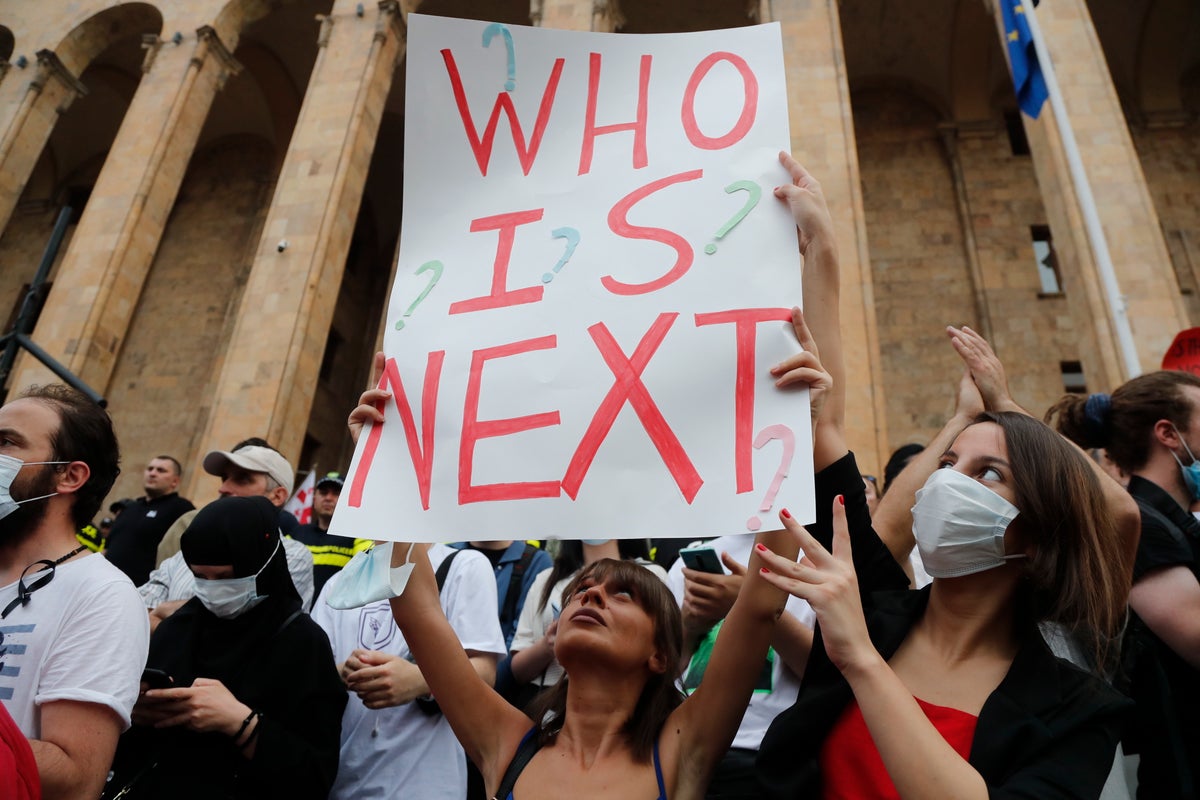
Thousands took to the streets in Tbilisi, Georgia, on Sunday, to demand the resignation of prime minister Irakli Garibashvili, following the death of a journalist after being beaten by anti-LGBT+ protesters.
They could be seen in front of the Georgian parliament, holding signs reading “Who is next” and “First they came for the journalists – we don’t know what happened next,” following attacks on pride activists and journalists at a scheduled pride march a week ago.
Alexander Lashkarava, who had been working as a cameraman for independent station TV Pirveli, was badly beaten by anti-LGBT+ protesters while covering the Tbilisi’s March for Dignity last Monday.
The Pride march was cancelled before it began, as organisers at Tbilisi Pride said authorities had not provided sufficient security guarantees.
In a statement, the organisation said authorities “not only failed to secure the safety of the queer community and our supporters, but actively hampered us from exercising the right of assembly”.
Opponents of the march ransacked the Tbilisi Pride office and blocked the capital’s main avenue where the march was due to take place, targeting activists and journalists. The anti-LGBT+ protesters denounced journalists on duty to cover the event as pro-LGBT+ propagandists and attacked them, throwing sticks, stones and bottles.
Mr Lashkarava was among 50 journalists who were attacked by the anti-LGBT+ groups opposing the march.
Miranda Baghaturia, Mr Lashkarava’s colleague at TV Pirveli, said that he had been beaten by a mob of around 20 people.
The 37-year-old was later pictured with bruises on his face and blood on the ground around him, with local media reporting that he was hospitalised and had to undergo surgery; it was also reported that he sustained fractures to his facial bones.
Alexander Lashkarava after being beaten by anti-LGBT+ protesters
(REUTERS)
He was discharged from the hospital on Thursday, but was found dead in his bed in the early hours of Sunday morning. The cause of his death was not immediately clear.
An investigation into his death has been launched by local police. While both the prime minister and president referred to Mr Lashkarava’s death as “a tragedy”, many hold the prime minister responsible for stoking anti-LGBT+ sentiment.
Ahead of the planned event, Mr Garibashvili spoke out against the Pride March and said that such events were “unacceptable for a large segment of Georgian society”.
Officially, the Black Sea nation decriminalised homosexuality in 2000 and adopted anti-discrimination laws in 2006 and 2014, but Pride events remain controversial in the conservative country strongly influenced by the Orthodox Church.
Just last month, the Orthodox Church described Pride events as aiming to “legalise grave sin”.
Critics have accused the prime minister’s Georgian Dream party of tacitly supporting homophobic and nationalist groups. Reporters Without Borders accusing the government of “culpable passivity” in the violence and Amnesty International saying that Georgian authorities’ failure to protect Tbilisi Pride “encourages violence”.
Related posts:
Views: 0
 RSS Feed
RSS Feed

















 July 12th, 2021
July 12th, 2021  Awake Goy
Awake Goy  Posted in
Posted in  Tags:
Tags: 
















